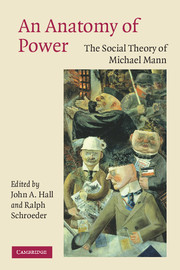Book contents
- Frontmatter
- Contents
- List of figures
- List of contributors
- 1 Introduction: the IEMP model and its critics
- Part I Theory, practice, method
- 2 Mann's transformation of the classic sociological traditions
- 3 Political questions
- 4 Mann's microfoundations: addressing neo-Weberian dilemmas
- 5 Grand, yet grounded: ontology, theory, and method in Michael Mann's historical sociology
- Part II Types of power
- Part III European exceptionalism?
- Part IV Promise and perils of modernity
- Part V Response
- Bibliography of Michael Mann's Writings
- Index
- References
3 - Political questions
Published online by Cambridge University Press: 22 September 2009
- Frontmatter
- Contents
- List of figures
- List of contributors
- 1 Introduction: the IEMP model and its critics
- Part I Theory, practice, method
- 2 Mann's transformation of the classic sociological traditions
- 3 Political questions
- 4 Mann's microfoundations: addressing neo-Weberian dilemmas
- 5 Grand, yet grounded: ontology, theory, and method in Michael Mann's historical sociology
- Part II Types of power
- Part III European exceptionalism?
- Part IV Promise and perils of modernity
- Part V Response
- Bibliography of Michael Mann's Writings
- Index
- References
Summary
No sociological enterprise of this magnitude has ever been undertaken that was not animated by some – tacit or implicit – political passion. One waits absorbed to see what that will prove to be.
(Anderson 1986: 176)Great treatises do indeed contain images of good and evil, of limits to our options given the constraints of social structure. So the central question at the heart of this chapter is that of Perry Anderson. Mann certainly has political views, and one contribution of this chapter is to complement Randall Collins's general picture with specific information about the more politicized British background from which Mann came. Of course, strongly held political views can be dangerous for scholarship: hope can replace analysis – as it did, for example, for Hobhouse and Ginsberg, sociologists at the London School of Economics long before Mann taught there. Let me say immediately that I do not think this is so for Mann. Rather he has followed empirical trails in directions he found unpleasant, and has quite often changed his mind as the result of substantive work. This gives me my subject matter. I suggest that there are tensions between his central political values, discovered early and maintained today, and his substantive discoveries. I seek to push him, in ways that might be uncomfortable, to confront ambiguities and lacunae. This should not be misunderstood, especially in light of an occasional personal comment.
- Type
- Chapter
- Information
- An Anatomy of PowerThe Social Theory of Michael Mann, pp. 33 - 55Publisher: Cambridge University PressPrint publication year: 2006
References
- 4
- Cited by

